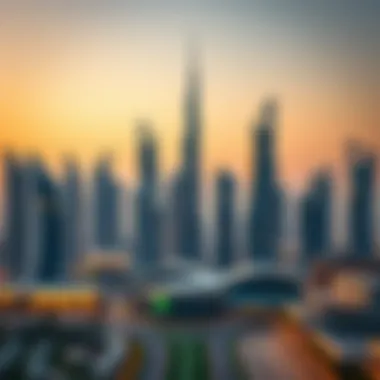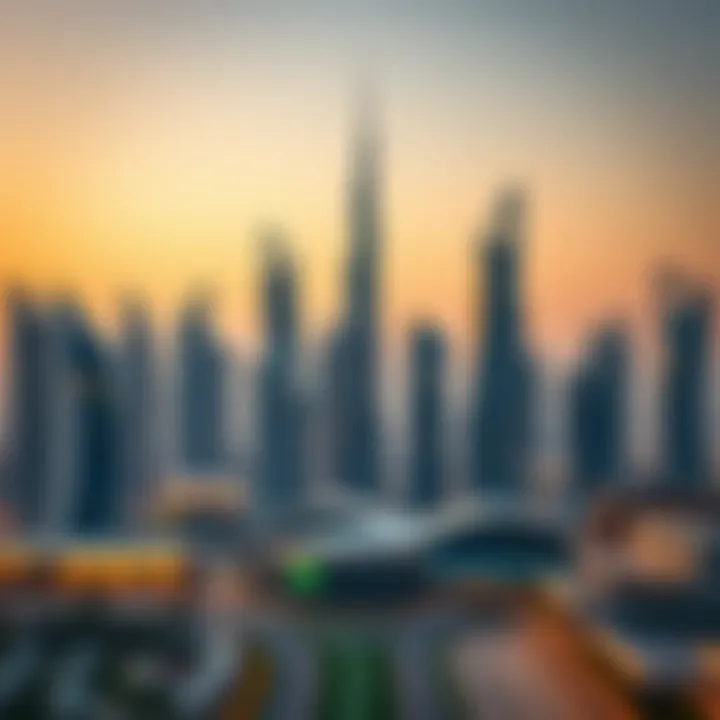Exploring Dubai's Real Estate Market Dynamics


Intro
Dubai's real estate market stands out like a glimmering mirage in a vast desert, constantly shifting and evolving. Over the years, it has transformed from a modest trading hub into a global metropolis, attracting investors, professionals, and families from diverse backgrounds. Understanding the dynamics of this market is crucial, as its future prospects are intertwined with various economic, cultural, and societal factors. This article aims to provide a detailed exploration of the trends, opportunities, and challenges faced in this vibrant sector, making it a worthwhile read for anyone considering involvement in Dubai's property landscape.
Market Trends
Current Real Estate Prices
As of late 2023, the real estate prices in Dubai are experiencing an upward trend that reflects the city’s strong economic recovery post-pandemic. With luxury villas and high-end apartments commanding shocking prices, it’s essential to sift through the noise to get to the core of the market.
In areas like Dubai Marina and Palm Jumeirah, prices have seen substantial increases, with some listings hitting over AED 25 million for exclusive waterfront properties. Conversely, neighborhoods like Jumeirah Village Circle and Discovery Gardens offer more affordable options, where prices can start around AED 700,000 for a modest apartment. This price disparity illustrates a significant aspect of the market: it offers something for everyone, irrespective of budget constraints.
Future Market Predictions
Looking ahead, forecasts suggest a mixed bag of opportunities and uncertainties. Analysts speculate that continued foreign investment, buoyed by favorable government regulations and visa reforms, will likely keep market prices on an upward trajectory. The Expo 2020 legacy, alongside ongoing developments in Dubai's infrastructure, may also push property values higher.
However, it’s also essential to acknowledge potential hurdles, such as economic fluctuations and over-saturation in certain sectors. Experts recommend keeping a close eye on the global economic climate, as shifts could influence investor sentiment and, subsequently, property values.
"The real estate landscape in Dubai is not just about trends; it's about understanding the interplay of global dynamics and local nuances."
Buying and Renting Guide
Essential Tips for First-Time Buyers
For those dipping their toes into the waters of Dubai's real estate for the first time, the process can be both exhilarating and daunting. Here are some essential tips:
- Research the Neighborhood: Each area has its flavor and community vibe. Whether it’s the bustling streets of Downtown or the serene surroundings of Arabian Ranches, understand what fits your lifestyle.
- Engage a Local Agent: A knowledgeable real estate agent can guide new buyers through the complexities of local regulations and market conditions.
- Understand the Costs: Apart from the purchase price, factor in additional costs like service charges, maintenance fees, and supplementary taxes. This is crucial to avoid any surprise expenses.
Navigating Rental Agreements
Renting is a common practice for many in Dubai, especially expats. Knowing the ins and outs of rental agreements can save headaches later. Consider these points:
- Read the Fine Print: Always review the lease terms carefully. Key elements like the duration of tenancy, renewal terms, and the policy on subletting should be clear.
- Deposit and Fees: Typically, landlords ask for a security deposit, usually equal to one month’s rent. Ensure you get this in writing and understand the conditions for getting it back at the end of your lease.
- Maintenance Responsibilities: Clarify who is responsible for maintenance issues. Knowing whether these fall on the landlord or the tenant can influence your decision.
By equipping yourself with knowledge, you can navigate Dubai's real estate landscape with confidence, harnessing its potential while being mindful of the challenges that may arise.
Prelude to Dubai's Real Estate Market
The real estate market in Dubai is a significant pillar of the economy, attracting a diverse group of local and international investors. Understanding this market isn't just about graphs and statistics; it's about grasping the intricate web of factors that drive growth and influence property values. This section will take a closer look at critical elements like market landscape and historical growth, both of which are essential for any investor looking to navigate the complexities of Dubai’s booming property sector.
Understanding the Market Landscape
The landscape of Dubai's real estate is unique, marked by rapid transformation and dynamic shifts. As an investor or stakeholder, acknowledging this landscape is crucial because it lays the groundwork for making informed decisions. Housing ranges from opulent penthouses overlooking the Burj Khalifa to more affordable apartments in developing neighborhoods. These choices reflect both local demands and international expectations.
Investment zones like Dubai Marina or Downtown tend to retain high appeal due to their prime locations and amenities. Moreover, off-plan properties have gained traction with investors looking to capitalize on future value. As the economy blooms and infrastructure advancements continue, understanding local demand becomes evident; it helps pinpoint emerging areas with growth potential.
Various factors influence the market landscape:
- Infrastructure Development: Dubai's investment in transport links and social infrastructure fuels interest.
- Economic Indicators: GDP and employment trends can signal market direction.
- Cultural Influences: Multiculturalism in Dubai creates a cornucopia of lifestyle preferences that affect buyer choices.
These aspects weave together to create a marketplace that is anything but static. Staying in tune with them is imperative for real estate aficionados.
Historical Overview of Dubai's Growth
The story of Dubai's real estate market is one of ambition and remarkable growth. Starting as a small fishing village, it has transformed into a world-renowned metropolis, mainly fueled by strategic planning and visionary leadership. The economic boom in the early 2000s saw a surge in development, with iconic projects like Palm Jumeirah introducing a new era in luxury living.
This historical backdrop reveals key phases in the market:
- Pre-2008 Crisis: Unrestricted growth characterized the market, leading to soaring prices and a robust investment climate.
- 2008 Global Financial Crisis: A significant downturn hit, resulting in price drops and tightening of investment flows. Some projects were stalled or put on hold.
- Recovery and Modernization: Following the crisis, a resilient recovery emerged, marked by diversification efforts and new regulations aimed at stabilizing the market. The government implemented laws to attract foreign investors, including long-term visas and property ownership rights for non-nationals.
Now, modern Dubai stands as a blend of tradition and innovation, with the real estate market reflecting this duality. As we rmove forward, the question on every investor's mind will be: how will this inspiring history shape the future of property in Dubai? Understanding the journey thus far will yield insights that help navigate this thrilling marketplace.
Economic Indicators Influencing Real Estate
Understanding the economic indicators that influence Dubai's real estate market is crucial for anyone looking to make informed investment decisions. Essentially, these indicators reveal the financial health of the region and its potential for growth. By examining the specific elements, such as GDP growth and employment trends, investors can gauge the market's trajectory and adapt their strategies accordingly.
Factors like economic stability directly impact buyer confidence, affordability, and ultimately, property values. When the economy is thriving, demand for real estate often increases, leading to heightened prices and a flurry of construction activity. On the flip side, downturns can signify a period of caution for both buyers and sellers alike. To navigate this complex landscape, understanding these economic signals is non-negotiable.
GDP Growth and Its Impact


GDP growth serves as a barometer for economic vitality. In Dubai, a robust GDP growth rate not only signifies a flourishing economy but also suggests that potential buyers are more financially secure. When the GDP rises, consumers have increased purchasing power, which can lead to greater investment in real estate.
Interestingly, Dubai's economy is highly diversified. Sectors like tourism, finance, and trade play pivotal roles, generating ongoing GDP growth. This means the real estate sector can benefit from increases in these areas. For example, as tourism rebounds, so does the demand for vacation rentals and luxury properties.
However, it's essential to remain cautious. High GDP growth can sometimes lead to overheating in the property market, where prices escalate beyond sustainable levels. Keeping an eye on GDP projections can help investors time their entry into the market to capitalize on upward trends, avoiding the pitfalls when the market inevitably corrects itself.
Employment Trends and Buying Power
Employment trends profoundly impact real estate dynamics. When job markets are healthy, more individuals can afford to buy homes, leading to increased demand. In Dubai’s scenario, the labor market has remained quite resilient, with sectors like hospitality and tech on the rise, fostering job security.
Higher employment levels directly correlate with buying power. As incomes rise, so do aspirations for home ownership. For instance, expatriates make up a substantial portion of Dubai’s workforce; as their job opportunities flourish, they often seek property investments as a pathway to stability and wealth accumulation.
Yet, potential buyers should be aware of the nuances. For example, while an influx of skilled workers can drive demand, a saturated market could lead to intense competition and inflated prices. Therefore, keeping tabs on employment indicators, such as unemployment rates and wage growth, is vital for understanding market conditions and making savvy investment choices.
"In real estate, knowledge is as good as gold; recent data is your most trusted ally."
This insight into GDP growth and employment trends highlights the intricate interplay of economic indicators shaping Dubai's real estate market. Investors who truly understand these dynamics are better poised to recognize opportunities and mitigate risks in this ever-evolving landscape.
Investor Sentiment and Behavior
Understanding investor sentiment and behavior is crucial when diving into Dubai's real estate market. This section can shed light on what drives investor decisions, from local preferences to international influences. The environment in which buyers operate plays a significant role in shaping the market dynamics. Positive sentiment can surge property values, while a bearish outlook can have quite the opposite effect, creating uncertainty among stakeholders. As Dubai continues to capture attention from a global audience, gauging the underlying thoughts and feelings of its investors cannot be overstated.
Local vs. International Investors
Dubai has become a melting pot for investors, with a distinct contrast between local and international buyers. Each group brings its unique expectations and motivations, impacting the overall market landscape profoundly.
On one hand, local investors often prioritize proximity to their businesses and social networks. They are keen on properties that resonate with their lifestyle, valuing factors like neighborhood familiarity and cultural significance. Many local buyers prefer apartments in areas like Downtown Dubai, where the buzz of the city meets luxury living.
On the flip side, international investors might be swayed more by potential returns on their investment rather than personal affinity for the area. They often gravitate towards high-end developments such as Palm Jumeirah, drawn in by the promise of rental yields and appealing tax structures. According to recent data, about 40% of property transactions in Dubai are made by foreign investors, a testament to the city’s global allure.
While both local and international investors have complementary interests, their differing perspectives can lead to fluctuations in demand. For instance, during times of political disturbance or economic downturns in an investor's home country, international interest might wane, while locals may continue to engage actively.
"Understanding the motivations behind buyer behavior is essential in devising investment strategies that are timely and effective."
Understanding Buyer Preferences
Grasping the preferences of buyers is fundamental in the ever-evolving real estate scene in Dubai. Whether it's affluent individuals seeking luxury or families looking for affordable housing, knowing who your buyers are can streamline development projects and marketing efforts.
Firstly, luxury buyers often seek exclusivity. They tend to prefer spacious villas with high-end amenities, a direct reflection of their lifestyle aspirations. Neighborhoods like Emirates Hills or Dubai Marina often fit the bill, presenting opulence and stunning views. Factors such as design, architecture, and finishing materials heavily influence their decisions. What sets high-net-worth individuals apart is their inclination towards properties that not only offer a roof over their heads but also embody an enviable lifestyle.
Conversely, affordable housing has piqued the interest of younger demographics, particularly expatriates. Many of them are on the lookout for starter homes that don’t break the bank while offering a comfortable living experience. Locations like Jumeirah Village Circle and Dubai Sports City are gaining traction for being budget-friendly while remaining accessible.
To cater to these diverse segments, real estate developers are focusing on tailored solutions. Engaging with potential buyers through surveys or community consultations can reveal insights that may not be immediately apparent. Additionally, leveraging platforms such as social media or local forums can provide invaluable feedback and foster a sense of loyalty among new buyers.
In essence, understanding preferences is not merely about knowing what buyers want; it's about anticipating market shifts and adapting accordingly. By staying attuned to the pulse of the community, one can harness opportunities that align with investor aspirations.
Recent Trends in Property Sales and Rentals
The ever-evolving nature of Dubai's real estate market has made it imperative for investors, buyers, agents, and developers to stay attuned to the latest trends in property sales and rentals. A keen understanding of these trends allows stakeholders to seize opportunities and navigate potential pitfalls effectively. The shifts in consumer behavior, market dynamics, and economic indicators paint a clearer picture of where the market is headed. Keeping an eye on these trends not only informs investment strategies but also enhances decision-making during a significant financial commitment.
Luxury Market Dynamics
Dubai has long been renowned for its lavish lifestyle, and the luxury real estate segment reflects this opulence. In 2022, the luxury market saw a notable uptick, with high-end properties in areas like Palm Jumeirah and Downtown Dubai witnessing increased sales activity. This surge can be attributed to several factors:
- Growing Affluence: A significant rise in the number of high-net-worth individuals (HNWIs) attracted to Dubai's favorable tax regime, safety, and lifestyle amenities.
- Global Mobility: Easing travel restrictions post-pandemic has reinvigorated interest from international buyers, driving demand for luxury villas and penthouses.
- Investment in Infrastructure: High-stakes developments like the Expo 2020 site have contributed to increased property values in and around the luxury market.
Furthermore, the demand for features such as plunge pools, private gardens, and expansive views has risen, signaling shifts in buyer preferences. Real estate agents have noted that buyers are now valuing privacy and space more than ever, particularly in light of the pandemic.
"Understanding the luxury market requires recognizing changing buyer behaviors and preferences, as luxury is no longer just about the price, but the living experience itself."
Affordable Housing Developments
While luxury properties grab headlines, affordable housing remains a crucial part of Dubai's real estate landscape. The government has placed significant emphasis on making housing accessible to residents and expatriates alike. In recent years, there have been several noteworthy developments aimed at enhancing affordability:
- Balanced Market Approach: Developers are increasingly focusing on creating mixed-use spaces that incorporate affordable housing with premium areas to ensure diverse communities.
- Government Initiatives: The Dubai Land Department has introduced favorable regulations and initiatives, such as incentivizing developers to invest in affordable housing projects, ensuring these homes meet modern standards.
- Shifting Demographics: Young professionals and families moving to Dubai are seeking budget-friendly options that offer amenities previously limited to upscale neighborhoods. This has led to the rise of popular districts like Dubai South and Jumeirah Village Circle, which cater to a broader audience without compromising on quality.
Urban Development and Infrastructure
Urban development and infrastructure play a pivotal role in shaping the real estate market in Dubai. As the city continues to expand and evolve, understanding these dynamics is essential for investors, buyers, and industry stakeholders. The synergy between infrastructural development and real estate values is significant, affecting everything from market trends to investment decisions.


Key Real Estate Projects
Throughout Dubai, numerous elite real estate projects have emerged that showcase the ambitious vision of the city’s planners. These projects are not just about constructing buildings; they are about creating entire communities that foster livability, accessibility, and sustainability.
For instance, the Dubai Harbour encompasses over 20 million square feet and aims to establish a new coastal hub with residential and commercial spaces. It’s set to enhance the vibrancy of the waterfront while adding substantial value to nearby property investments. Likewise, the Expo 2020 venue, now dubbed District 2020, presents a remarkable transformation from an event space to a long-term community incorporating green spaces and smart city initiatives. Projects like these reflect the profound connection between urban growth and real estate potential.
"In Dubai, a project isn't just a structure; it's a reflection of a future."
Moreover, developments such as Dubai Hills Estate and Bluewaters Island introduce a blend of luxury living with accessible amenities. These high-profile projects attract both local and international buyers, directly influencing the real estate landscape.
Impact of Transportation on Real Estate Value
Transportation infrastructure is a critical factor in determining property values and investment attractiveness. Dubai’s strategic investments in transport have had transformative effects on its real estate market. The expansion of the Dubai Metro, alongside the integration of tram services and new road projects, facilitates smoother movement across the city, enhancing accessibility to various communities.
When evaluating potential investments, consider how proximity to public transport hubs affects property value. Studies show that properties located near metro stations often command higher prices due to the convenience they offer.
- Benefits of good transportation access:
- Increases property demand
- Attracts businesses and residents
- Enhances urban connectivity
Furthermore, the upcoming Al Maktoum International Airport and developments like the Dubai Creek Harbour are spotlighted by their anticipated impacts on property values in surrounding areas. As new transport links emerge, they stimulate economic growth and elevate property attractiveness, making those living near these areas likely to see robust appreciation in their property investments.
Regulatory Environment and Policies
The regulatory landscape surrounding real estate in Dubai is pivotal. It shapes the market, influencing investor perception and guiding their decisions. Having a clear understanding of the regulations can lead to informed investments and profitable ventures. This section will dissect the key elements of Dubai's property laws and government initiatives that amplify investment confidence.
Understanding Property Laws
Dubai's property laws are distinctive, designed to accommodate both local and international investors. The framework was established to promote transparency and security in transactions. A few key laws stand out:
- Freehold and Leasehold: Since 2002, non-UAE nationals have been able to own property on a freehold basis in designated areas. This is a significant factor as it opened up the market to foreign investment.
- Regulatory bodies: The Dubai Land Department plays a crucial role in overseeing property transactions, ensuring all dealings comply with the law. This organization maintains records to protect investor rights and provide a clear title deed for buyers.
- Real Property Registration Law: An essential framework that arrived in 2007 ensures that all real estate transactions are registered, providing legal protection and clarity to both buyers and sellers.
Knowing these laws is crucial. For instance, understanding the implications of buying a property under a freehold vs. leasehold agreement can impact long-term investment strategies. It is beneficial to consult with legal experts familiar with the nuances of Dubai's property laws before proceeding.
"Navigating through Dubai's property laws without proper guidance could lead to costly mistakes."
Government Initiatives to Boost Investment
Dubai’s government continuously rolls out initiatives aimed at stimulating growth in the real estate sector. Here are some standout initiatives:
- Long-Term Visas: In 2019, the introduction of long-term visas (valid for up to 10 years) for property investors facilitated foreign ownership. It fosters a sense of stability amongst investors who are looking to plant roots in the emirate.
- 100% Business Ownership: The government introduced a law allowing 100% foreign ownership of businesses, which extends to real estate investment. This move reflects an intent to enhance the investment climate and attract global talent.
- Expo 2020: Hosting this global event has garnered international attention and significantly impacted real estate sales and rentals. The infrastructure developments and influx of tourists have boosted property values and rental demand, providing a lucrative opportunity for investors.
Understanding these government initiatives is vital. They enhance the attractiveness of Dubai as a premier destination for real estate investment, which makes it essential for investors to keep abreast of ongoing and future policies.
Through these mechanisms, the regulatory environment continues to evolve, creating a landscape that balances investor needs with market stability. Whether one is a seasoned investor or a newcomer, familiarity with this dynamic is crucial for navigating Dubai's real estate market successfully.
For further details on property laws, you can refer to the Dubai Land Department’s official site at Dubai Land Department.
The Role of Technology in Real Estate
Technology plays an increasingly pivotal role in the real estate landscape of Dubai, fundamentally altering how transactions are carried out and properties are marketed. As the city evolves into a smart city, embracing digital advancements is not just advantageous; it is becoming essential for survival in the competitive property market. This section highlights specific elements that underscore the importance of technology in enhancing operational efficiency, improving client interactions, and streamlining processes.
PropTech Innovations
PropTech, or property technology, encapsulates a myriad of innovations that are transforming the real estate sector. These advancements range from sophisticated data analytics tools to smart building technologies. One notable example is the use of big data and machine learning algorithms, which allow real estate companies to analyze market trends and make data-driven decisions. The ability to interpret vast amounts of data enables investors and agents to identify lucrative opportunities and manage risks effectively.
Moreover, smart home technologies, including automated systems for lighting, heating, and security, are becoming increasingly attractive to buyers. These innovations not only enhance the living experience but also contribute to energy efficiency, resonating with the growing global emphasis on sustainability. Real estate companies in Dubai are leveraging these technologies to market properties as cutting-edge and forward-thinking, differentiating themselves in a crowded marketplace.
- Increased Transparency: Technology fosters a degree of transparency previously unachievable. Blockchain, for example, secures property transactions, ensuring clear and unalterable records.
- Enhanced Customer Experience: Virtual reality (VR) technologies allow buyers to tour properties remotely. Potential investors can explore multiple listings from the comfort of their home, saving time and resources.
"The integration of technology in real estate is not just about convenience; it's about redefining the entire buying and selling experience and making it more efficient and trustworthy."
Digital Platforms for Buyers and Sellers
As digital natives come to dominate the real estate market, the landscape of buying and selling property is shifting at a rapid pace. Whether through mobile apps or dedicated websites, the accessibility of information at the fingertips of consumers is unparalleled. Potential buyers can now browse listings, compare prices, and read neighborhood reviews online before making any commitments.
Key benefits of these platforms include:
- 24/7 Accessibility: Investors and buyers are no longer constrained by the conventional hours of real estate offices. They can peruse listings any time, day or night, leading to informed decisions based on their schedules.
- Comprehensive Data: Users can obtain extensive information about properties, including price history, square footage, and even local market trends, enhancing their ability to negotiate.
- Interactive Features: Many platforms now incorporate features such as chatbots for instant assistance and AI-driven recommendations based on user preferences, streamlining the search process.


Market Forecasts and Predictions
Market forecasts and predictions play a pivotal role in understanding the landscape of Dubai's real estate. These insights illuminate potential opportunities and challenges, allowing investors and stakeholders to make informed decisions. Real estate is inherently tied to fluctuating economic cycles, making predictions more than mere guesses; they serve as crucial guides. The market's responsiveness to various indicators can effectively inform strategies for both immediate engagement and long-term investment plans.
Investors should pay attention to a range of factors that can influence the market dynamics. Local and international economic conditions, demographic trends, and government regulations may all impact property prices and demand. Considering these elements in forecasting not only aids in understanding where the market is headed but also highlights the benefits of strategic planning.
Short-Term vs. Long-Term Outlook
The distinction between short-term and long-term outlooks is essential when evaluating the real estate market in Dubai. The immediate horizon can be quite volatile, influenced by seasonal demand and economic fluctuations. For example, short-term trends might show spikes in demand during events like the Dubai Shopping Festival, which can lead to a temporary increase in rental prices.
In contrast, the long-term outlook usually paints a more stable picture. Over the years, such as from the 2010s into the early 2020s, Dubai has seen sustained growth due to infrastructural developments, population migration, and a shift toward more diversified economic activities. Here are a few key points to consider in each outlook:
- Short-Term Outlook:
- Long-Term Outlook:
- Understanding temporary market boosts and lulls
- Adapting quickly to external shocks (like global economic changes)
- Opportunity to capitalize on seasonal markets (like Airbnb during tourism peaks)
- Emphasis on sustainable growth strategies
- Value of holding properties for appreciation over years
- Anticipating neighborhood development and infrastructure expansion
Investors need to balance their strategies between these perspectives, often keeping a keen eye on short-term variables while building for the future.
Emerging Neighborhoods to Watch
As Dubai continues to evolve, several neighborhoods are emerging as hot spots for investment. Recognizing these areas can provide investors with an edge, positioning them strategically ahead of trends. Among the neighborhoods gaining traction are:
- Dubai Creek Harbour:
Located along the waterfront, this area is set to become a blend of leisure, retail, and residential options that appeal to families and young professionals alike. The potential for growth is substantial, driven by tourism and real estate projects. - Jumeirah Village Circle (JVC):
With its increasingly popular community feel and affordability, JVC continues to attract a diverse crowd. The expansion of amenities and higher-quality developments currently in the works will likely increase its appeal further. - Dubai South:
Home to the Expo 2020 site, this neighborhood is positioned as a pivotal business and logistics hub. With the long-term focus on connectivity and future infrastructure, it promises a significant upside for investors. - Downtown Dubai:
Although it’s already known for luxury market dynamics, pockets of potential and new developments still offer investment opportunities, particularly as ongoing projects add vibrancy to the area.
These emerging neighborhoods illustrate that while some areas in Dubai are firmly established, new opportunities persist. Investing in these locales not only captures immediate market benefits but also positions investors favorably for future growth.
"Understanding the pulse of emerging neighborhoods in Dubai is akin to sensing the tides. Successful investors adapt and ride the wave at the right moment."
In summary, careful assessment of the market forecasts, along with an understanding of both short-term and long-term dynamics, can equip investors with the insight necessary to navigate Dubai’s evolving real estate landscape successfully.
Sustainability and Eco-Friendly Developments
Sustainability in real estate has emerged as more than just a trend; it is now a necessity driven by awareness of environmental challenges and market demands. In Dubai's vibrant real estate landscape, sustainable practices are becoming etched into the very fabric of property development. This section delves into the significance of eco-friendly developments in Dubai and explores the various facets that contribute to this growing movement.
Green Building Practices in Dubai
The concept of green building isn't a mere buzzword in Dubai; it's turning into the standard with significant implications for investors and developers alike. Green buildings are designed to enhance the efficiency of resource use while minimizing the negative impacts on the environment.
- Energy Efficiency: Many structures are now powered by renewable energy sources, such as solar panels. The integration of energy-efficient appliances and environment-friendly materials contributes to reduced energy consumption, resulting in lower operating costs.
- Water Conservation: In a region where water is scarce, systems that recycle water and the use of low-flow plumbing fixtures are becoming commonplace. This not only boosts sustainability but also ensures more reliable utility management for residents.
- Sustainable Materials: The use of locally-sourced and sustainable materials minimizes the carbon footprint associated with transportation and production. Developers are starting to realize that opting for such materials can enhance property value while appealing to environmentally-conscious buyers.
- Landscape Design: Incorporating native vegetation and xeriscaping assists in low maintenance and water-efficient outdoor spaces, creating a more sustainable environment.
In brief, the adoption of green building practices signals to investors that Dubai is ready to not only face the challenges posed by climate change but also to lead by example. The return on investment for these properties, often enhanced by energy savings and higher demand, makes a compelling case for embracing eco-friendly construction.
Government Policies for Sustainable Development
Dubai’s government is keen on positioning its real estate sector at the forefront of sustainable development through a multifaceted approach, including several critical policies aimed at promoting eco-friendly practices. The aim here is not just about compliance but about fostering innovation in building methods.
- Dubai Green Building Regulations set benchmarks on energy and water efficiency, requiring new buildings to adhere to specific sustainability standards. These regulations inspire developers to maximize efficiency from the ground up.
- Initiatives like the Dubai Clean Energy Strategy outline ambitious plans to reach 75% of energy from clean resources by 2050, resting heavily on the improvements in real estate efficiency and technology adoption.
- The Dubai Land Department actively encourages sustainability by offering incentives for projects that integrate green practices. Such financial incentives can influence developers' decisions toward eco-friendly options, paving the way for long-term benefits.
- Collaborative projects with organizations like the Arabian Gulf Cooperation Council provide additional frameworks and best practices to help local developers refine their sustainability strategies.
In essence, these policies are not merely regulatory; they are integral to shaping a sustainable urban future in Dubai. The legislation actively supports the drive towards a greener city, catering to a market that increasingly demands environmentally responsible living spaces.
"Investing in sustainability today creates a resilient real estate market that can weather the storms of tomorrow."
As the world shifts towards sustainability, investors in Dubai's real estate market stand to gain from aligning with eco-friendly practices. Not only does this cater to a growing demographic of conscientious buyers, but it also contributes to the overarching goal of establishing Dubai as a hub of sustainable urban living.
End: The Future of Dubai's Real Estate Market
The future of Dubai's real estate market is not just a crystal ball gaze; it's a study of trends, behaviors, and reactions to the ever-changing dynamics of both local and global economies. Understanding how these elements interplay places investors in a stronger position to make well-informed decisions. This article highlights various dimensions of Dubai's market, thoughkey in navigating its momentum are the opportunities extended to investors alongside the challenges that lay in wait which should not be ignored.
Opportunities for Investors
Dubai has increasingly become a melting pot for investments, and it doesn’t look like that trend’s going to change anytime soon. In the present landscape, there are several opportunities available:
- Sector Diversification: The market remains diverse, offering options beyond traditional residential properties. Warehousing, mixed-use developments, and hospitality are gaining traction, enhancing potential returns.
- Rental Yields: With a growing expatriate population, rental properties are in high demand. Investors can benefit from attractive yields, especially in well-established neighborhoods or emerging areas.
- Regulatory Incentives: Recent governmental policies encourage foreign investments, including long-term visas for property investors. This fosters a more attractive investment climate, allowing foreign nationals to hold property in a city long known for its welcoming attitude.
- Sustainable Developments: As sustainability takes center stage, eco-friendly projects are seeing increased interest. The shift toward green living is not only appealing but command a premium on sales, arguably allowing for better margins.
Dubai is not merely about luxury. It represents a chance for forward-thinking investors looking to harness an evolving market that offers both diversity and resilience.
Challenges and Considerations
However, with every golden opportunity comes an array of challenges that one must wade through:
- Market Fluctuations: Nothing remains constant. Investors face the reality that fluctuations could be influenced by economic shifts, both local and global. Being prepared for volatility is paramount.
- Over-supply Risks: Too many developments can saturate the market, driving down property prices and potentially jeopardizing investment value. Staying informed about upcoming projects is key to avoiding dead-end investments.
- Regulatory Changes: The regulatory environment can shift, impacting investor rights and the ease of doing business. Keeping abreast of the laws is essential for both local and foreign investors to navigate the regulatory seas smoothly.
- Cultural Insights: Understanding local customs, market trends, and buyer sentiments is crucial. Investors unfamiliar with the regional particularities may find themselves at a disadvantage.
To put it simply, while the path to success in Dubai's real estate market is sprinkled with opportunities, it’s equally fraught with risks. Investors aiming to secure their stake in this thriving landscape must approach with a well-thought-out strategy, educated on the nuances of both current and future market dynamics. Here, knowledge isn’t just power; it’s a compass guiding one through complex waters.













